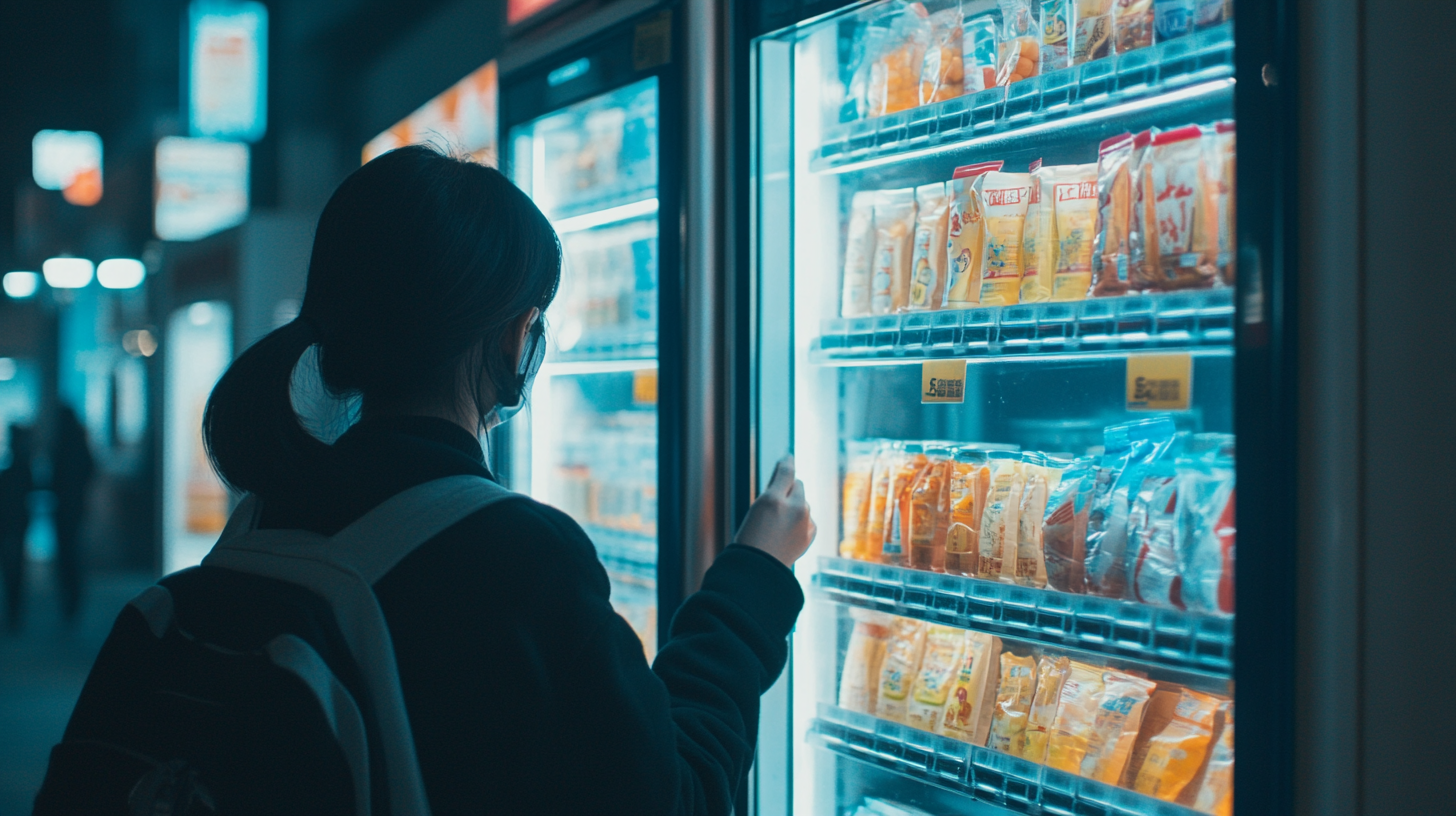Navigating Tariff Challenges: How the Best Capsule Vending Machine Thrives Amidst US-China Trade Tensions
In recent years, the global landscape of trade has been profoundly reshaped by escalating tariffs, particularly between the United States and China. As these economic giants engage in a tit-for-tat tariff war, many industries have faced significant challenges; however, one sector, notably the Capsule Vending Machine industry, has managed to navigate these turbulent waters with remarkable resilience. Despite the imposition of high tariffs on Chinese imports, the demand for innovative and versatile capsule vending machines has surged, showcasing a growing trend of reverse growth in Chinese manufacturing. This blog will explore how this segment not only withstands external pressures but also capitalizes on new opportunities, thereby redefining success amid adverse economic conditions. As we delve deeper into the strategies and innovations driving this industry, we’ll uncover the underlying factors that contribute to its thriving presence in a challenging environment.

The Impact of US-China Trade Tensions on Capsule Vending Machines Market Trends
The ongoing US-China trade tensions have significantly impacted various markets, including the capsule vending machines industry. As tariffs rise and supply chains face disruptions, manufacturers must navigate a complex landscape to sustain their businesses. This environment has forced many companies to reassess their sourcing strategies and diversify suppliers to mitigate risks. The trend is clear: a localized supply chain can provide manufacturers with the flexibility needed to adapt to rapidly changing tariffs.
When looking to thrive in this challenging market, companies should consider a few key tips. First, investing in technology can streamline production processes and reduce operational costs. Second, fostering strong relationships with local suppliers will not only bolster supply chain reliability but also support community economies. Lastly, understanding consumer preferences can guide product development, ensuring that offerings remain relevant despite market fluctuations.
As businesses adapt to these external pressures, staying agile and informed becomes crucial. Leveraging market research to anticipate changes in consumer demand can position brands advantageously. In a turbulent trade climate, those who embrace innovation while strengthening their local networks are more likely to succeed in the capsule vending machine space.

Emerging Opportunities for Chinese Manufacturers Amidst Tariff Hikes
In the wake of escalating US-China trade tensions, Chinese manufacturers are discovering new opportunities despite the challenges posed by tariff hikes. According to a report by the International Trade Administration, tariffs on Chinese goods have reached as high as 25%, prompting manufacturers to find innovative strategies to maintain competitiveness. This landscape has led companies to enhance their production efficiencies and seek alternative markets, effectively transforming obstacles into opportunities.
One such sector witnessing growth is the capsule vending machine industry, which sees a rising demand for convenient on-the-go solutions. A recent study by MarketWatch indicates that the global vending machine market is expected to grow at a CAGR of 9.1% from 2021 to 2028, driven by technological advancements and changing consumer preferences. Chinese manufacturers are leveraging this trend by investing in smart vending technologies, enabling real-time inventory management and personalized customer experiences, thus positioning themselves advantageously amidst tariff-related challenges.

Analyzing Consumer Behavior Shifts in Response to Increased Import Costs
As US-China trade tensions escalate, the recent imposition of high tariffs, particularly the 25% levy on various imports, has been a significant concern for American consumers. This shift in trade policy has led to increased import costs, which inevitably influences consumer behavior. Shoppers are now faced with tough choices: do they stock up on goods before prices rise further, or do they risk waiting for potential price drops? This uncertainty ultimately affects purchasing decisions across multiple sectors, from electronics to everyday essentials.
The rising costs associated with tariffs have also sparked shifts in consumer preferences. As prices climb, many are opting for lower-priced alternatives or making lifestyle adjustments, such as reducing discretionary spending. For businesses, understanding these behavioral changes is crucial for adapting marketing strategies and product offerings. Companies that can accurately analyze and respond to these evolving consumer trends will be better positioned to thrive during these turbulent economic times. Thus, the ability to navigate the impact of tariffs not only affects pricing but also plays a pivotal role in shaping the future of consumer markets.
Navigating Tariff Challenges: Capsule Vending Machine Sales Trends (2018-2023)
This chart illustrates the sales trends of capsule vending machines from 2018 to 2023, showcasing the impact of US-China trade tensions and increased import costs on consumer behavior and demand.
Technological Innovations Driving Growth in Capsule Vending Solutions
As US-China trade tensions continue to escalate, many businesses are grappling with the implications of tariffs and supply chain disruptions. However, the best capsule vending machines are finding ways to thrive amidst these challenges by leveraging technological innovations. Automated systems and smart vending solutions have evolved significantly, allowing operators to optimize their inventory and reduce reliance on traditional supply chains. This adaptability not only mitigates the impact of tariffs but also enhances customer service by providing a seamless purchasing experience.
One of the key technological advancements driving growth in capsule vending solutions is the integration of IoT (Internet of Things) capabilities. These systems enable real-time tracking of inventory levels and consumer preferences, allowing for more efficient restocking and tailored offerings. Additionally, contactless payment methods have become increasingly popular, catering to a market that values convenience and hygiene. By embracing these innovations, capsule vending machine operators can not only cope with economic uncertainties but also position themselves as leaders in a competitive landscape.
Navigating Tariff Challenges: How the Best Capsule Vending Machine Thrives Amidst US-China Trade Tensions - Technological Innovations Driving Growth in Capsule Vending Solutions
| Dimension | Details |
|---|---|
| Capsule Vending Machine Brands | Brand A, Brand B, Brand C |
| Major Markets | North America, Europe, Asia |
| Impact of Tariffs | Increased costs, supply chain adjustments |
| Technological Innovations | AI-powered inventory management, cashless payment systems |
| Growth Strategies | Diversification of product offerings, strategic partnerships |
| Trends | Healthy options, eco-friendly packaging |
| Sales Projections | Projected 15% annual growth through 2025 |
Strategies for Capsule Vending Operators to Mitigate Tariff Impacts
In the context of escalating US-China trade tensions, capsule vending machine operators are facing significant challenges due to tariffs on imported goods. To navigate these shifts, operators must prioritize sourcing and supply chain strategies. Diversifying suppliers can mitigate risks; by exploring alternative manufacturers in other regions, operators can decrease their dependence on Chinese imports, thus reducing tariff impacts. Additionally, building relationships with local suppliers can help ensure consistent quality and availability while contributing to the local economy.
Another key strategy is to focus on pricing adjustments and value propositions. Operators can enhance their offering by emphasizing unique features or high-quality products that justify any potential price increases due to tariffs. This could involve curating exclusive capsule blends or introducing limited-time offerings that attract customers despite higher costs. Marketing these innovations effectively can help maintain customer loyalty and drive sales in a competitive landscape. Furthermore, leveraging technology to optimize operations and reduce overhead costs can provide a buffer against fluctuating prices, ensuring the long-term viability of capsule vending machines amid challenging economic conditions.
